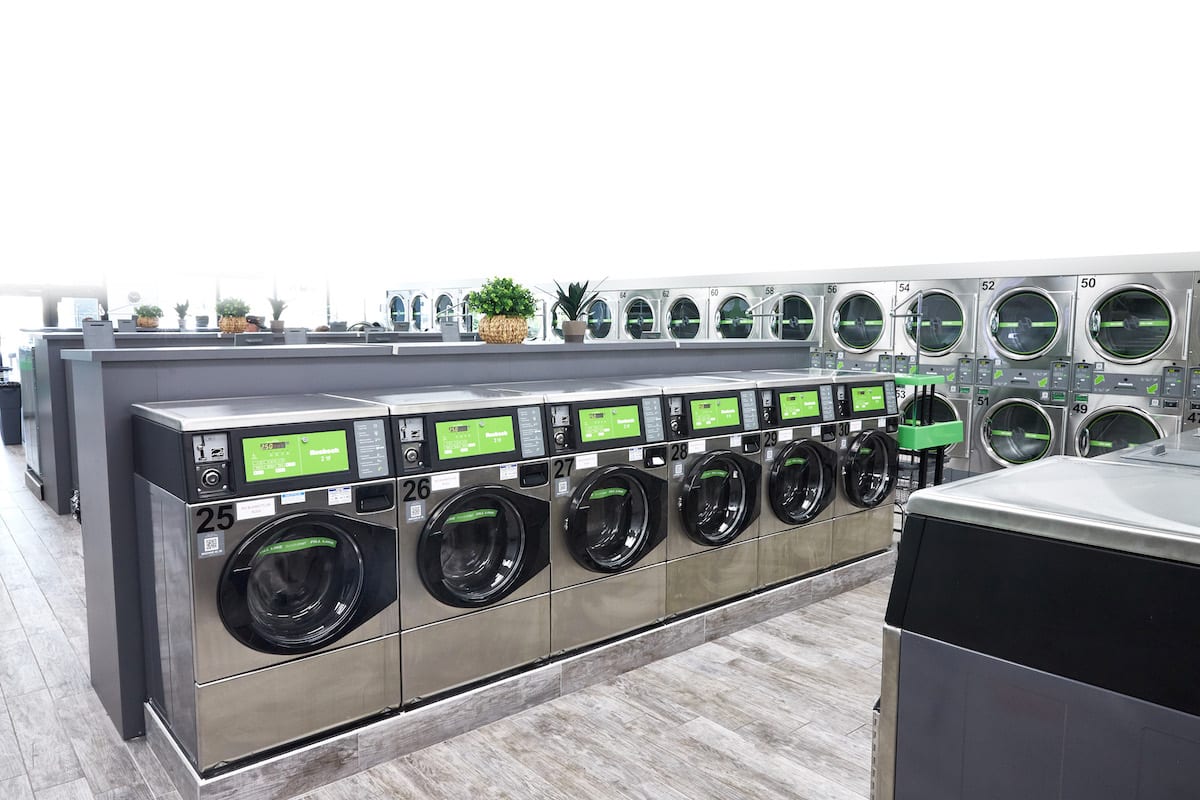
Learn what it takes to open a coin laundry
What’s it take to open a coin-operated laundromat? How much money will you need to do it? Should you buy or lease property? What is the best location for a laundromat? What other considerations should you be aware of before opening a coin laundry?
You’ve got questions and Huebsch, a leader on helping new investors start a coin-operated laundromat, has more than a few answers. As is always the case with most new business ventures, the key is having someone knowledgeable in your corner. That’s why it’s important to select an experienced distributor – not just someone who sells equipment; but a partner who can assist with everything from location selection, financing, equipment mix, layout, permitting and a variety of tasks after the grand opening. Use our distributor locator to find a Huebsch partner in your area.
Below are a few more items that may help you determine if you are ready to open a coin laundry.
- Buying the existing laundry business or building. This one is a no-brainer. If you decide to buy an existing coin laundry or building, that’s going to be a major expense. The price varies heavily depending on the value of the property and business. However, you can expect pricing to be somewhere between $200,000 to $500,000 on average. There may be additional costs for inspections, realtor fees, and more within your purchase price as well.
- Lease/rental costs. If you’re leasing or renting a space, you’ll have a down payment and the first rental fee due upfront in many cases. Plus, you’ll need to budget for your ongoing rental fees.
- Remodeling. If you’re planning on making any changes to an existing facility, you’ll want to account for construction and building costs. Again, the price here is going to fluctuate dramatically depending on the project. A few gallons of paint or some new flooring are relatively cheap, but major changes — like moving walls or redoing the plumbing system — get pricey.
- Commercial laundry equipment. If you bought an existing laundromat, you may have some equipment to work with. However, you may want an equipment upgrade or be starting fresh. This price will change based on your specific needs and facilities. Generally, equipment is one of the biggest (and most important) investments you’ll make for your laundry business. At Huebsch, we offer hassle-free, competitive financing options to help you outfit your laundromat with the best equipment.
- Legal fees. You should be consulting with an attorney to make sure you’re dotting all the i’s and crossing all the t’s in terms of your business. They’ll help you through the many facets of opening your laundromat, including contracts and leasing agreements or organizing a business partnership (if you opt to open your laundromat with a friend or family member). Keep in mind, this will be an ongoing expense for your business as well, as various legalities come into play, so it’s in your best interest to find a good legal partner right away.
- Permits and tap or hookup fees. Many cities and towns charge fees for various permits necessary for building and/or operating a business. Again, this will vary depending on where you live and the scope of your operation. In addition, many towns require you to pay a tap or hookup fee to connect your laundry equipment to the water and sewer system. This fee varies per machine. Again, this isn’t required in all areas and if you purchased a laundromat with machines already installed, you may avoid this fee. However, you should lean on your commercial laundry distributor as a resource and expert when it comes to outlining the fees and permits necessary for opening a laundromat.
- Research and subscription fees. While the internet has a plethora of information, not all the resources you’ll want or need are free. You’ll likely incur some costs during the process of starting your laundry business — whether it’s buying demographics and industry reports from the Coin Laundry Association, books on entrepreneurship, or purchasing an Amazon Prime membership for your new business.
- Utilities. This is one of the top expenses for laundromats, as your machines use a lot of electricity, water, and gas. Generally, you won’t have to pay this right away, but probably not too long after your business is up and running. Plus, you’ll want to budget for this as an ongoing expense. Looking for washers and dryers with energy-efficient design and features, like Huebsch Galaxy Controls, will help you save money over time.
- Insurance. You’ll want to make sure you have all areas of your business insured — from liability insurance to protection in case of a fire or theft — from the get-go. Many factors impact your monthly rates and what type of coverage you need. It’s best to talk to an insurance agent and shop around for rates to get the best policy and pricing for your laundry business.
- Accessories. If you’re offering any extra amenities or accessories at your laundromat, you’ll want to budget for those as well. Installing Wi-Fi or cable for you and your guests may cost a $50-$100 installation fee. If you need a new computer for your business, that can be $500 or more. Plus, there are other laundromat accessories, such as carts, hangars, soap, and furniture, that you’ll likely want to invest in. Depending on your overall budget for the property, many of these accessories can be bought secondhand or on sale for a lower cost or added at a later time as funds become available.
- Miscellaneous supplies. Last, but not least, are those miscellaneous supplies that you probably won’t think about until you need them. This includes things like cleaning, bathroom, and office supplies — toilet paper, soap, a mop, a broom, cleaners, pens, printer paper, etc. Separately, these items are relatively inexpensive, but purchasing a large selection of them at once can add up quickly. Don’t forget to budget for these types of supplies in your ongoing expenses as well.
In general, the laundry industry has an overall high success rate and high ROI of 25 to 35%. The current pandemic has also illustrated the essential nature of laundromats. When other small businesses have been closed, laundromats have remained open, reinforcing their recession resistance as well. Finance rates, low real estate and lease prices and equipment rebates/promotions have all combined to make this an excellent time to get into the laundromat business.



